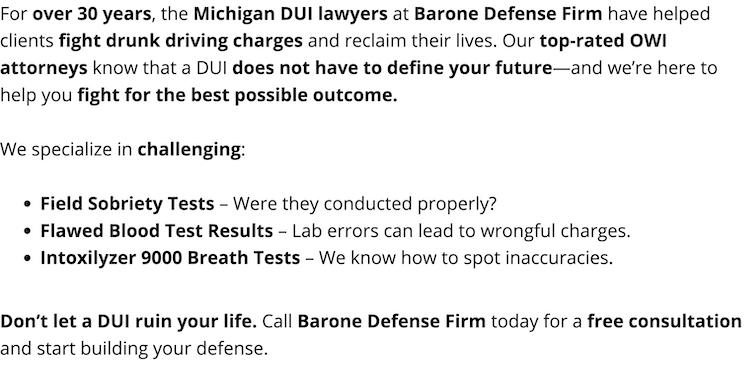Standard of Proof in a DUI Case
In a very general sense, the standard of proof in a DUI case is beyond a reasonable doubt. This is the trial standard when the issue is whether you are guilty of the crime alleged. There are other standards of proof that might apply as depending on the type of legal analysis being employed. The standard of proof necessary to obtain a warrant or make an arrest is probable cause. An even lower standard, reasonable cause, applies to the administration of a PBT prior to arrest. If you refused a breath or blood test, then the appliable standard at the implied consent hearing is preponderance of evidence. You can now see that it's impossible to discuss standard of proof in a DUI case without first knowing for what purpose the standard is being applied.
Another way of looking at standard of proof is thinking about the various kinds of drunk driving. In Michigan, there are several different charges that may stem from a drunk or drugged driving arrest, which is why is it important to contact a Michigan DUI attorney. The specific offense that you are charged with will depend on the factors of your case.
How do These Charges Differ?
For the average person with no legal background, it may be difficult to distinguish these charges from one another. The most important thing to remember is that the prosecution is going to pursue whichever charge they think they can prove beyond a reasonable doubt in court. To do that, certain criteria must be met:
To be convicted of OWI based on the chemical test, referred to as an UBAL (unlawful bodily alcohol level) OWI, the prosecution need only show that you were operating a vehicle while having a blood alcohol level of .08% or greater. In an OWI UBAL case, it may not matter how intoxicated you may have appeared or whether you "passed" the field sobriety tests. If the state can show that your BAC was at or above the legal threshold at the time of driving, you can be found guilty. In legal terms, this is referred to as the statutory or "per se" theory.
To be found guilty of OWVI (operating while visibly impaired), the state needs to show that your ability to safely operate the vehicle was lessened due to alcohol or drugs (or both). This means that you can end up with a drunk driving charge on your record even if you tested under .08% BAC. In the legal community, this is known as a common law theory and an impaired driving charge does not require a breath or blood test.
The standard of proof for an OWPD (operating with the presence of drugs) or OWPCS (operating with the presence of a controlled substance) charge involving illegal (non-prescription) drugs is even lower. To convict you of this charge, the state merely needs to show that, at the time of driving, you had a trace amount of any illicit or controlled substance in your system. The OWPCS charge only applies to Schedule I drugs, such as Heroin. Your lawyer should be able to tell you if you are facing this charge by reviewing the chemical tests in your case and comparing the results to the drugs listed on the State and Federal drug Schedules.
 Barone Defense Firm Home
Barone Defense Firm Home
















